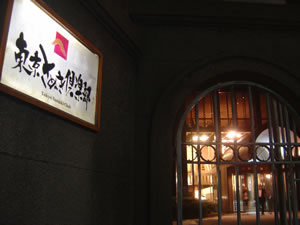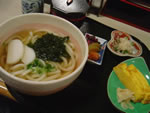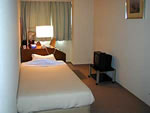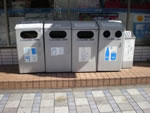

 During the three-week orientation program in Tokyo all students will stay at the Sanuki Club hotel in the Azabu-jubanneighborhood in Minato-ku, Tokyo. This is in a very convenient location, just a five minute walk from the Azabujuban Metro Station. Azabu-juban is home to numerous embassies and is a very international neighborhood with a wide range of restaurants and shops within walking distance of the hotel. The NanoJapan program pays for your room and daily breakfast at the Sanuki Club during the orientation period.
During the three-week orientation program in Tokyo all students will stay at the Sanuki Club hotel in the Azabu-jubanneighborhood in Minato-ku, Tokyo. This is in a very convenient location, just a five minute walk from the Azabujuban Metro Station. Azabu-juban is home to numerous embassies and is a very international neighborhood with a wide range of restaurants and shops within walking distance of the hotel. The NanoJapan program pays for your room and daily breakfast at the Sanuki Club during the orientation period.

 Rooms at the Sanuki Club are single-occupancy with a shared bathroom and shower on your floor; similar to a U.S. dormitory. There is also a large bath in the basement that guests may use during regularly scheduled hours. While small, all rooms include a bed, desk, lamp, television, and wardrobe/closet. There is an elevator in the hotel. Students can access free wireless internet in the lobby from 6:30 AM to 10:30 PM. For breakfast you have a choice of Western-style, Japanese-style, or Udon Noodles - the specialty of the Sanuki Club. There is no curfew at the Sanuki Club though you will need to leave your room key with the front desk when leaving the hotel and pick it up when you return.
Rooms at the Sanuki Club are single-occupancy with a shared bathroom and shower on your floor; similar to a U.S. dormitory. There is also a large bath in the basement that guests may use during regularly scheduled hours. While small, all rooms include a bed, desk, lamp, television, and wardrobe/closet. There is an elevator in the hotel. Students can access free wireless internet in the lobby from 6:30 AM to 10:30 PM. For breakfast you have a choice of Western-style, Japanese-style, or Udon Noodles - the specialty of the Sanuki Club. There is no curfew at the Sanuki Club though you will need to leave your room key with the front desk when leaving the hotel and pick it up when you return.
The Sanuki Club also accepts individual reservations and we highly recommend this hotel to any visitors or travelers looking for convenient and budget-friendly accommodation in Tokyo. Double-occupancy rooms with private bath are also available.
Housing at your research university will vary depending on the availability of on-campus or near campus housing for visiting international researchers. Some campuses will have an International Student Dormitory or housing specifically for short-term visiting researchers. At campuses where dormitory or international student dormitories are not available you will stay in an off-campus guesthouse or apartment.
The NanoJapan program will work with your research host lab to identify available housing near your university and you will be provided with this information prior to departure. You will use your NanoJapan stipend to pay for all housing costs at your research internship and in some cases there may be additional paperwork or deposits that you will need to submit to confirm your housing reservation. Housing costs and amenities will vary widely at the different research host universities though your stipend will be sufficient to fully cover your housing and basic living costs.
While housing is very important and the NanoJapan program strives to locate the best housing options at each of our host universities we ask that all students be prepared for differences from what they are accustomed to in the US. As with all things when traveling abroad it is best to approach your housing with an open mind and flexible attitude. Housing size, cost, location, and amenities will vary greatly depending on what is available at your research host university. You will be solely responsible for abiding by all stated rules and regulations at your housing and for payment of any fees or other assessments your housing should charge if your damage your room, furnishings, or other housing facilities.
In some cases your housing may also have cultural or social activities arranged for you and most students will find that they are living with other international students and visiting researchers from all around the world. This is a great opportunity for you to meet people from other countries and learn a bit more about why a student from China or the Middle East also thinks it is important to study and do research in Japan.
 Some student dormitories, guesthouses, or accommodations may have curfews in Japan as this is a common safety and security measure. This will be quite different than what you are accustomed to in the US but you must abide by all stated curfews and housing rules. Exceptions are typically not made as rules are rules in Japan and tend to be strictly followed and enforced. If you don't arrive back at your housing before curfew you may be locked out until the next morning.
Some student dormitories, guesthouses, or accommodations may have curfews in Japan as this is a common safety and security measure. This will be quite different than what you are accustomed to in the US but you must abide by all stated curfews and housing rules. Exceptions are typically not made as rules are rules in Japan and tend to be strictly followed and enforced. If you don't arrive back at your housing before curfew you may be locked out until the next morning.
 Some housing, including most guesthouses, will include the cost of utilities such as electricity, water, and trash with your monthly rent. In some cases you may be billed monthly based on your actual usage or may need to pay a utility deposit. Some housing may also charge a maintenance or cleaning fee that may or may not be reimbursable upon check-out. The NanoJapan program will provide you with all the information available on applicable fees at your housing though you should carefully review all housing agreements, documents, and paperwork provided and direct any questions to your housing or dormitory manager.
Some housing, including most guesthouses, will include the cost of utilities such as electricity, water, and trash with your monthly rent. In some cases you may be billed monthly based on your actual usage or may need to pay a utility deposit. Some housing may also charge a maintenance or cleaning fee that may or may not be reimbursable upon check-out. The NanoJapan program will provide you with all the information available on applicable fees at your housing though you should carefully review all housing agreements, documents, and paperwork provided and direct any questions to your housing or dormitory manager.
 Rooms in Japan tend to be much smaller than in the US and have limited storage space. This is one more reason why it is good to just bring one large suitcase with you; otherwise your luggage may take up most of the space in your room. Most rooms will be furnished Western style with a bed, closet or wardrobe, and basic furnishings (desk, lamp, etc.) though at some guesthouses your room may Japanese-style with tatami mats and a futon.
Rooms in Japan tend to be much smaller than in the US and have limited storage space. This is one more reason why it is good to just bring one large suitcase with you; otherwise your luggage may take up most of the space in your room. Most rooms will be furnished Western style with a bed, closet or wardrobe, and basic furnishings (desk, lamp, etc.) though at some guesthouses your room may Japanese-style with tatami mats and a futon.
 Some rooms/apartments will have a private shower and bath but most students will stay in housing with a shared bathroom and/or shower room for the floor or suite, similar to a US university dormitory.
Some rooms/apartments will have a private shower and bath but most students will stay in housing with a shared bathroom and/or shower room for the floor or suite, similar to a US university dormitory.
 Most students - though not all - will have access to shared kitchen facilities at their housing. Some facilities may supply cooking pots/pans, utensils, plates, bowls, and glasses but if these are not provided you can purchase them inexpensively at a 100 Yen Store or may be able to borrow some supplies from your lab group members.
Most students - though not all - will have access to shared kitchen facilities at their housing. Some facilities may supply cooking pots/pans, utensils, plates, bowls, and glasses but if these are not provided you can purchase them inexpensively at a 100 Yen Store or may be able to borrow some supplies from your lab group members.
 During the re-entry period you will stay at Rice University in on-campus student housing. These rooms are furnished but bedding, pillows, and towels are not provided. We recommend students plan to bring a small travel pillow and blanket ortravel sleep sheet/sack with you to use during this time and while you are abroad in Japan.
During the re-entry period you will stay at Rice University in on-campus student housing. These rooms are furnished but bedding, pillows, and towels are not provided. We recommend students plan to bring a small travel pillow and blanket ortravel sleep sheet/sack with you to use during this time and while you are abroad in Japan.
All hotels and ryokans in Japan will provide bedding but past participants report that pillows in Japan are not as large or comfortable as pillows in the US. If you have a preference for a specific type of pillow it may be best to bring your own pillow and pillowcase with you.
During the research internship period some housing, but not all, will provide bedding or let your rent bedding from the housing manager to use during your stay there. In some cases you may need to purchase your own bedding and you can typically do so at a nearby department store or use the blanket/pillow ortravel sleep sheet/sack that you brought with you.
We also recommend that students bring at least one towel and washcloth with them to Japan as past students have reported that the towels available in Japan aren't as large or absorbent as what is common in the U.S. Microfiber travel towels/washcloths are a good option as they are easy to pack and dry quickly - important during the hot, humid summers in Japan.
 Not all dormitories will provide internet and/or the speed and bandwidth of the internet that is provided may not support applications such as Video Skype, MMOs, streaming video, etc. If you don't have internet access at your dormitory you should be able to use the internet at your research lab or you can ask your research group members where the nearest internet cafeis located. Most are open 24 hours and already have popular applications such as Skype pre-loaded. Internet cafes are particularly popular with fans of MMO games in Japan. They typically charge by the hour and you can usually purchase drinks or small snacks as well.
Not all dormitories will provide internet and/or the speed and bandwidth of the internet that is provided may not support applications such as Video Skype, MMOs, streaming video, etc. If you don't have internet access at your dormitory you should be able to use the internet at your research lab or you can ask your research group members where the nearest internet cafeis located. Most are open 24 hours and already have popular applications such as Skype pre-loaded. Internet cafes are particularly popular with fans of MMO games in Japan. They typically charge by the hour and you can usually purchase drinks or small snacks as well.
 While your housing may provide a TV this does not mean that they will provide any English-language channels. Don't count on being able to watch streaming videos or movies online either as the bandwidth or speed of internet available may not support this. Rather, come prepared with some movies or your favorite shows downloaded to an external hard drive or your computer so you have something to watch on those days when you are tired and just want to relax at home - or plan to go to an internet cafe to watch shows and videos online.
While your housing may provide a TV this does not mean that they will provide any English-language channels. Don't count on being able to watch streaming videos or movies online either as the bandwidth or speed of internet available may not support this. Rather, come prepared with some movies or your favorite shows downloaded to an external hard drive or your computer so you have something to watch on those days when you are tired and just want to relax at home - or plan to go to an internet cafe to watch shows and videos online.
You can see Western movies at most theaters in Japan though they are usually released weeks or even up to a month after the U.S. premiere. Some movies will be dubbed into Japanese and others will be in English with Japanese subtitles. If you aren't sure ask someone in your research lab if they know how the movie will be presented. Movies theaters in Japan are usually very nice and more expensive than in the U.S.
 Most housing will have coin-operated laundry facilities available though in some cases you may need to visit a nearby laundromat. Ask someone at your housing to show you how to use the machines the first time if you aren't sure or to show you where the nearest laundromat is. You can purchase laundry soap and dryer sheets at most 100 Yen Shops or convenience stores.
Most housing will have coin-operated laundry facilities available though in some cases you may need to visit a nearby laundromat. Ask someone at your housing to show you how to use the machines the first time if you aren't sure or to show you where the nearest laundromat is. You can purchase laundry soap and dryer sheets at most 100 Yen Shops or convenience stores.
 To Americans used to throwing everything into one trash container living in Japan can be quite an eye-opening experience. Your housing will likely provide you with an extremely detailed booklet or instructions on exactly how you should sort your trash and what can and cannot be poured down the drain. It is important you abide by all instructions regarding sorting of trash as most municipalities have very strict recycling regulations and impose heavy fines when trash is not sorted properly. For more on sorting trash in Japan click here.
To Americans used to throwing everything into one trash container living in Japan can be quite an eye-opening experience. Your housing will likely provide you with an extremely detailed booklet or instructions on exactly how you should sort your trash and what can and cannot be poured down the drain. It is important you abide by all instructions regarding sorting of trash as most municipalities have very strict recycling regulations and impose heavy fines when trash is not sorted properly. For more on sorting trash in Japan click here.
Guesthouses are a great option for short to mid-term foreign travelers to Japan and offer a wide range of types of housing - from dormitories to apartments. You can stay in a guesthouse for one night, one week, one month or up to one year. The benefit of guesthouses is that all costs are typically included in your rent and since they cater specifically to foreigners they may also include amenities such as high-speed wireless internet, English-language TV channels, and have English-speaking staff on hand to assist you. Many guesthouses also have cultural or social events arranged for their guests that provide opportunities for you to learn more about Japanese culture and meet fellow travelers from all around the world.
The links below are provided as a reference for those interested in learning more about guesthouses in Japan. If you are a NanoJapan student please do not try to locate housing on your own - the program will assist you with this process though the resources below might be useful if you have family/friends come to visit you while you are in Japan or if you need housing during any weekend trips you take during the summer.